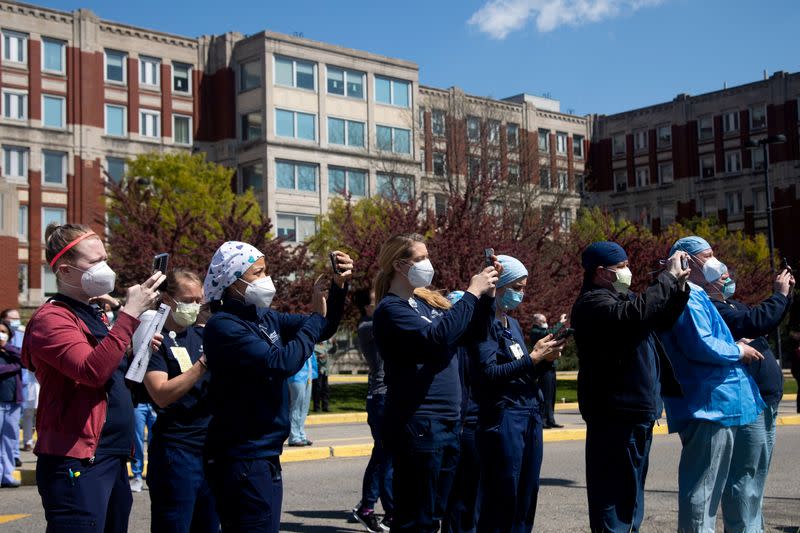
By Nancy Lapid
(Reuters) - The following is a brief roundup of some of the latest scientific studies on the novel coronavirus and efforts to find treatments and vaccines for COVID-19, the illness caused by the virus.
Open https://ift.tt/2SLXyj2 in an external browser for a Reuters graphic on vaccines and treatments in development.
Engineered decoys trap virus before it can enter cells
The new coronavirus enters cells by attaching to a protein on the cell membrane called the ACE2 receptor. Scientists have now developed a decoy version of ACE2 that lures the virus and traps it, preventing it from infecting human lung cells in test tubes. "We have engineered our ACE2 Trap to bind 100 to 1,000 times tighter to the virus than normal ACE2 that is on victim cells. This provides even more potent blockage that is comparable to neutralizing antibodies," Dr. James Wells of the University of California at San Francisco told Reuters. While actual ACE2 receptors have effects on blood vessels, the decoys do not. Their only purpose is to trap the virus, the research team reported in a paper posted on bioRxiv on Saturday ahead of peer review. "We believe it may be possible to produce both injectable and possibly inhaled versions of our most potent ACE2 trap as a therapeutic," Wells said, noting that there are still many development steps before the idea could be used in people. His team believes their receptor decoys could also be useful against other coronaviruses that infect cells via the ACE2 receptor, and furthermore, the strategy could be applied to other cell membrane receptors used by other respiratory viruses. (https://bit.ly/3i7kN0T)
COVID-19 risk high in frontline healthcare workers
Healthcare workers in the United States and Britain with direct patient contact - particularly those who are Black, Asian, and other ethnic minorities - report higher rates of positive COVID-19 tests than individuals in the general community, even with adequate personal protective equipment (PPE), new data suggest. Using the Zoe COVID Symptom Study smartphone app, researchers followed roughly 2 million community members and 100,000 frontline healthcare workers. For every 100,000 participants, 242 community members reported positive COVID-19 tests, compared with 2,747 frontline healthcare workers. About 14% of community members reported at least one coronavirus-related symptom, compared with 20% of healthcare workers. Black, Asian, and minority ethnic healthcare workers had at least a five-fold increased risk of COVID-19 compared with the non-Hispanic white general community. Frontline healthcare workers who reported inadequate PPE or re-use of PPE had even higher risks, especially if they cared for coronavirus patients. But even with adequate gloves, masks and other protections, frontline healthcare workers still had higher rates of coronavirus infection, according to a report on Friday in The Lancet Public Health journal. (https://bit.ly/33gf2tI)
COVID-19 survivors may face fitness impairments
Hard evidence on patients' long-term prognosis after COVID-19 is lacking, because the novel coronavirus is so new. But data on patients who recovered from the similar coronavirus that caused the global SARS outbreak in 2003-2004 suggest recoveries will be prolonged. Reviewing 10 earlier studies involving more than 500 SARS patients, researchers found that physical function and fitness were impaired for months afterward, and in some cases were still impaired years later. Greater levels of impairment in physical function after 12 months were seen in patients who had required ventilators for breathing assistance, suggesting that more severe COVID-19 may be associated with a prolonged, more difficult recovery. Evidence from one randomized controlled trial suggests exercise may have helped some of the patients recover physical function and fitness. "Considering the similarities ... of SARS-CoV (the virus that caused SARS) and COVID-19, it is anticipated that people with COVID-19 will experience similar impairments to physical function and fitness," the researchers said on Friday in the medical journal Physical Therapy. Given the rising number of COVID-19 cases and the significant proportion of people who are hospitalized and require care in an intensive care unit, "it is likely that many people will require rehabilitation to promote recovery postinfection." (https://bit.ly/3gnUKCs)
Pandemic telemedicine boom leaves many seniors behind
The boom in telemedicine necessitated by COVID-19 lockdowns may be problematic for seniors, many of whom lack internet access or have disabilities that make it difficult for them to get online. A survey of over 600,000 U.S. patients over age 65 found roughly 41% did not have a computer with a high-speed internet connection at home, and about the same percentage did not have a smartphone with a wireless data plan. The proportion with neither was 26% overall, rising to 50% among those with incomes below the federal poverty level. A separate survey of more than 4,500 seniors found that roughly 20% had physical issues, such as hearing loss, vision impairment or cognitive decline, that could make video visits difficult or impossible. Many do not regularly use the technology needed for telemedicine, coauthor Dr. Kenneth Lam of the University of California at San Francisco told Reuters. In addition, he said, "If someone told me 'my grandmother has been coughing' or 'my dad says his stomach hurts,' it makes me uneasy if I can't see the patient," Lam said. The results of both surveys were reported on Monday in JAMA Internal Medicine. (https://bit.ly/2Xo9fie; https://bit.ly/2BS0iG6)
(Reporting by Nancy Lapid and Linda Carroll; Editing by Bill Berkrot)
Health - Latest - Google News
August 04, 2020 at 01:16AM
https://ift.tt/2DyijJY
Engineered decoys trap virus in test tube study; healthcare workers at high risk even with protections - Yahoo News
Health - Latest - Google News
https://ift.tt/2zrj9Ud
Bagikan Berita Ini














0 Response to "Engineered decoys trap virus in test tube study; healthcare workers at high risk even with protections - Yahoo News"
Post a Comment